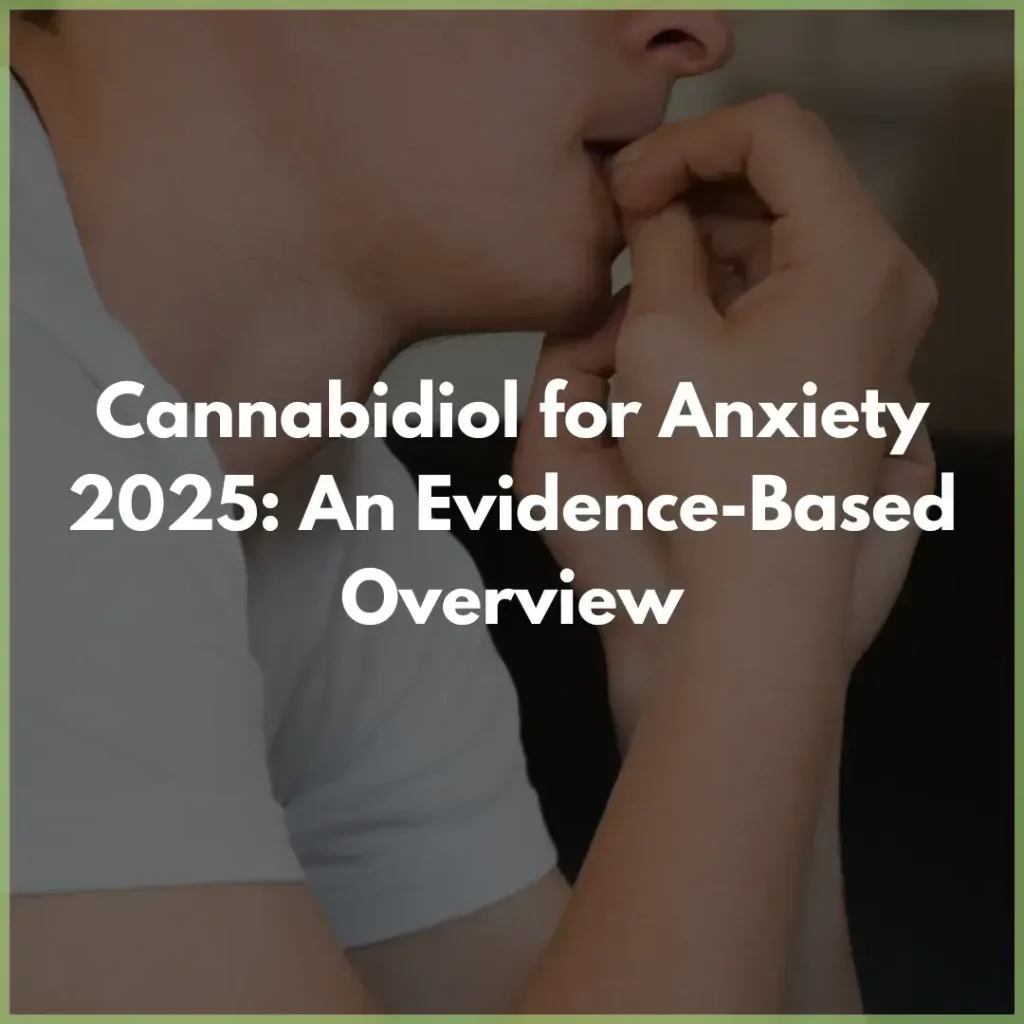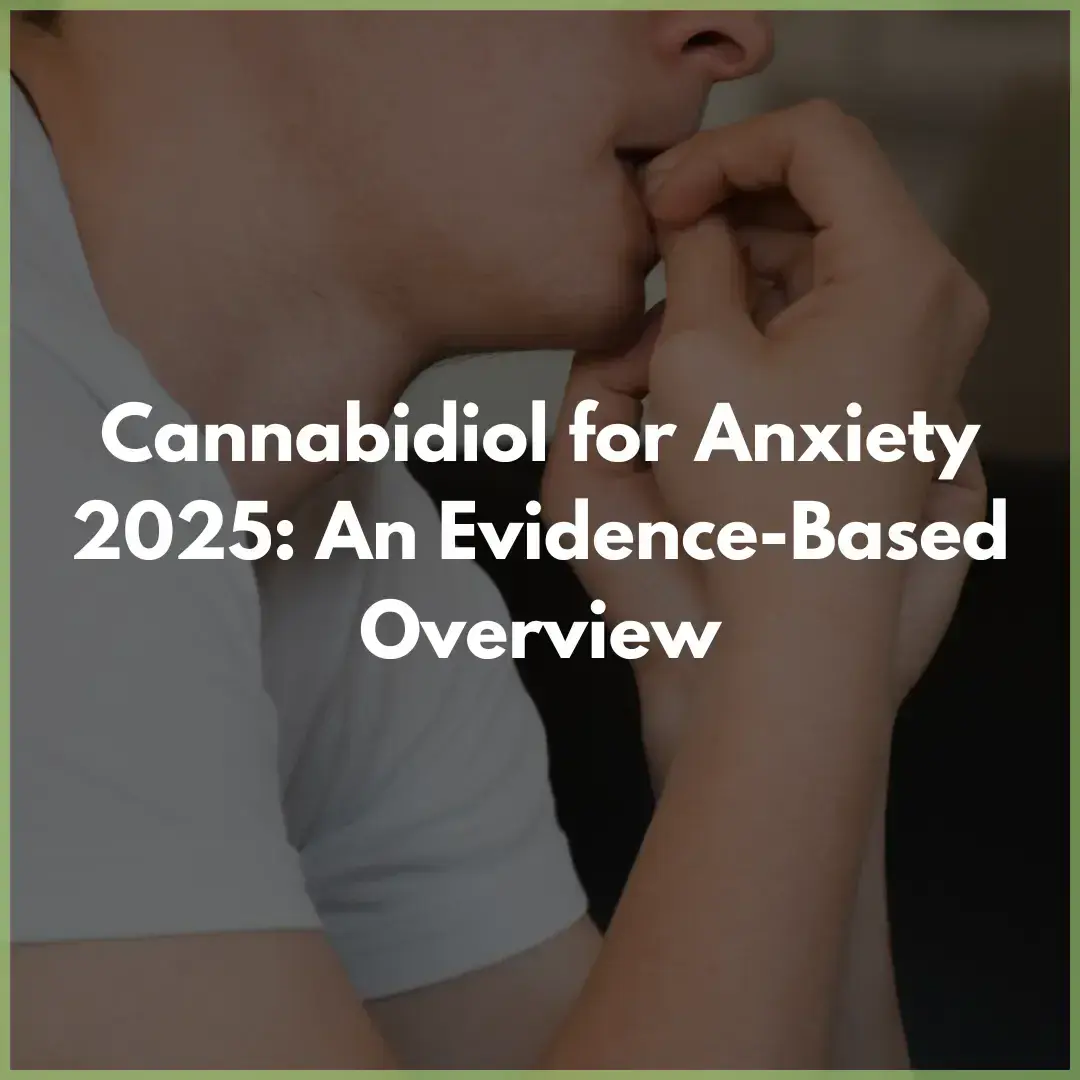
Is Cannabidiol for anxiety really effective? This article will look into the current evidence to see if CBD can help with anxiety or not.
Please note – this article is for educational purposes only, our products are not for medical use.
Summary
- Cannabidiol (CBD) is often used for anxiety and shows therapeutic potential without the side effects of traditional pharmaceuticals.
- Pre-clinical research suggests CBD’s anxiolytic effects, especially for chronic anxiety and social anxiety disorder, although dosing is key for therapeutic effect.
- Ongoing clinical trials and future research are needed to validate CBD for anxiety disorders and to see how it can be used with other treatments.
What is Cannabidiol (CBD)
Cannabidiol, commonly known as CBD, is the most abundant cannabinoid in the hemp plant (Cannabis sativa-L).
Unlike its cousin THC, CBD does not get you high, making it a good option for those looking for potential therapeutic benefits without any intoxicating effects.
CBD is extracted from hemp, a cannabis sativa variety with low THC and high CBD. But it can also be made synthetically in a lab. Most people prefer natural, full spectrum CBD oil, as it contains the widest range of natural hemp compounds.
Repeating cannabidiol treatment has a cumulative effect, making it good for long-term use. Cannabinoid research on CBD’s anxiolytic effects has opened up new avenues for medical cannabis treatment, especially for anxiety disorders.
Interest in CBD goes beyond its therapeutic potential to its safety profile and long-term effects. Studies show CBD is well tolerated with a low risk of side effects, making it a good potential alternative to traditional pharmaceuticals.
Pre-Clinical Research on CBD for Anxiety
Pre-clinical research has given us a lot of information on CBD’s potential for anxiety disorders. Various animal models have also been used to study CBD’s anxiolytic effects, with promising results.
These studies have shown a significant reduction in anxiety-like behaviors, indicating CBD could be a potential treatment for anxiety symptoms.
One of the key findings from pre-clinical research is that higher doses of CBD do not always equal a greater reduction in anxiety levels. This means dosing is important, the effects of CBD can vary depending on the amount given.
Neuroimaging studies have also helped us understand how CBD affects the brain. These studies have identified the brain regions, such as the amygdala, that are affected by CBD.
The amygdala is involved in processing emotions and responses to stress, making it a key target for anxiety treatment. The modulation of this brain region by CBD is a big part of its anxiolytic effects.
Some animal studies have shown that CBD can reduce anxiety caused by stressful situations. For example, in models of generalised anxiety disorder, repeated cannabidiol treatment has shown sustained reduction in anxiety symptoms.
This is good news for those with chronic anxiety, as it means ongoing CBD treatment could potentially provide long-term relief.
Clinical trials are the next step to validate these preclinical research findings. Double-blind, placebo-controlled studies are necessary to see if CBD works for anxiety disorders in humans.
These randomised trial studies will provide important data on the safety and efficacy of CBD oil and will help establish it as a treatment for anxiety disorders, as noted in J Clin Psychiatry, contributing to clinical and cognitive improvement.
Systematic reviews and clinical studies will also support these findings.
The anxiolytic effects of CBD have also been looked into for social anxiety disorder. Social anxiety disorder is characterised by intense fear and avoidance of social situations, which can greatly impact an individual’s quality of life.
Pre-clinical research has shown that CBD may reduce anxiety severity in these models, so there is hope for those with social anxiety. The anxiolytic effect of CBD is a promising area of research.
CBD is also being studied for other anxiety-related disorders such as posttraumatic stress disorder (PTSD) and pediatric anxiety. While research is ongoing, early results suggest CBD could be a possible treatment.
Human experimental anxiety studies simulate anxiety-inducing situations to see CBD’s effect on anxiety symptoms. Results show CBD may reduce anxiety in these situations.
Overall, pre-clinical research shows CBD has a lot of potential as a treatment for anxiety disorders. The anxiolytic effects of CBD, its effect on brain regions, and dosing are all part of its therapeutic profile.
These findings set the stage for clinical trials, which will further explore the efficacy and safety of CBD for anxiety.
Future Research on CBD for Anxiety
Clinical trials are currently looking into CBD as a treatment for anxiety disorders. These trials will validate the therapeutic effects of CBD and determine the effective dosing for different anxiety disorders.
Future research should determine CBD’s efficacy for different anxiety disorders and psychiatric disorders, dosing and long-term outcomes.
This includes studies on generalised anxiety disorder, generalised social anxiety disorder, PTSD and pediatric anxiety.
Most CBD studies so far have been done on male subjects, so more research is needed to include gender differences in anxiety treatment and treatment response, especially in mental health.
Addressing this gap is important to ensure potential CBD treatments work for everyone.
The current evidence on CBD for anxiety treatment is not conclusive, so more research is needed. Recent evidence suggests more studies are needed to build a robust body of evidence for CBD for anxiety disorders.
This will involve large-scale, randomised controlled trials that will provide high-quality data on the safety and efficacy of CBD oil.
The endocannabinoid system’s interaction with CBD is key to modulating emotional behaviour and stress responses, so this is important for anxiety treatment. Future research will delve deeper into this interaction to understand CBD’s potential for anxiety disorders.
Future research should also look into CBD’s potential to treat co-occurring conditions such as chronic pain and substance use disorders. Since anxiety often coexists with other conditions, understanding how CBD can address these complex cases is important for clinical application.
Identifying the molecular targets of CBD and understanding its mechanisms of action will help develop more targeted and effective treatments for anxiety disorders.
Integrating CBD into existing treatment protocols such as CBT and exposure therapy is another area of interest. Combining CBD with established treatments could enhance cognitive improvement and provide more comprehensive care for individuals with anxiety disorders.
As CBD is available in many different forms, from oils to gummies and CBD patches, research will need to determine which delivery method is most suitable for anxiety.
The future of CBD research for anxiety is exciting, many areas to explore. Ongoing and future clinical trials will provide critical data on efficacy, safety and long term outcomes of CBD treatment.
Conclusion
In summary, the research on CBD for anxiety is unfolding fast, with promising pre-clinical and clinical findings.
CBD has a lot of potential as an anxiolytic treatment, for those with anxiety disorders. But more research is needed to confirm these findings, determine dosing and ensure the safety of CBD as a treatment.
Looking forward, ongoing and future clinical trials will hopefully provide the data to support CBD for anxiety. The continued exploration of CBD’s mechanisms of action, interaction with the endocannabinoid system, and potential to treat co-occurring conditions will establish it as a treatment.
Frequently Asked Questions
CBD, or cannabidiol, is a non-psychoactive compound from the cannabis plant that doesn’t get you high, unlike THC which is responsible for the high. The difference in how it interacts with brain receptors is what sets CBD apart from THC.
CBD may be beneficial for anxiety treatment as studies show it can potentially reduce symptoms of generalised anxiety disorder, social anxiety disorder and PTSD. The anxiolytic effects are supported by both pre-clinical and clinical research.
While CBD is generally well tolerated with low risk of side effects, drug interactions may occur. Consult a healthcare professional before using CBD for anxiety.
CBD for anxiety treatment can be administered through oils, capsules, edibles or vaporised forms, each method affects the onset and duration of its effects. Choose the right form for you.
Future research on CBD for anxiety will determine its efficacy across different anxiety disorders, dosing, long-term effects and interaction with the endocannabinoid system through clinical trials. This will solidify the foundation for its therapeutic use in anxiety treatment.

